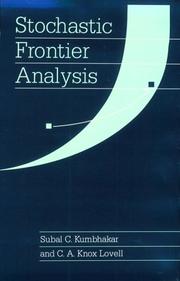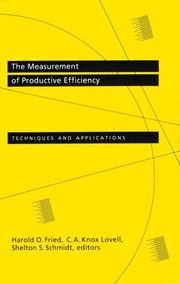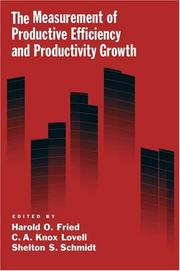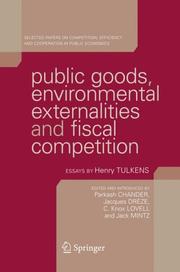| Listing 1 - 4 of 4 |
Sort by
|

ISBN: 0521481848 0521666635 1107713188 110771057X 113917441X 9780521481847 9781139174411 9780521666633 Year: 2000 Publisher: Cambridge: Cambridge university press,
Abstract | Keywords | Export | Availability | Bookmark
 Loading...
Loading...Choose an application
- Reference Manager
- EndNote
- RefWorks (Direct export to RefWorks)
Modern textbook presentations of production economics typically treat producers as successful optimizers. Conventional econometric practice has generally followed this paradigm, and least squares based regression techniques have been used to estimate production, cost, profit and other functions. In such a framework deviations from maximum output, from minimum cost and cost minimizing input demands, and from maximum profit and profit maximizing output supplies and input demands, are attributed exclusively to random statistical noise. However casual empiricism and the business press both make persuasive cases for the argument that, although producers may indeed attempt to optimize, they do not always succeed. This book develops econometric techniques for the estimation of production, cost and profit frontiers, and for the estimation of the technical and economic efficiency with which producers approach these frontiers. Since these frontiers envelop rather than intersect the data, and since the authors continue to maintain the traditional econometric belief in the presence of external forces contributing to random statistical noise, the work is titled Stochastic Frontier Analysis.
Stochastic processes --- Production (Economic theory) --- Stochastic analysis --- Econometrics --- 338 --- Economics, Mathematical --- Statistics --- Analysis, Stochastic --- Mathematical analysis --- Microeconomics --- Supply and demand --- Demand (Economic theory) --- Supply-side economics --- Business, Economy and Management --- Economics --- Stochastic analysis. --- Econometrics. --- AA / International- internationaal --- 305.3 --- Econometrie van de productiefuncties en van het gebruik van de capaciteiten (Cobb-Douglas functie) Econometrie van de groei --- Econometrie.

ISBN: 0195072189 1423737512 0195361105 1280441267 1601298501 9781423737513 9780195072181 9781280441264 9786610441266 661044126X 0197710409 Year: 1993 Publisher: New York (N.Y.) : Oxford university press,
Abstract | Keywords | Export | Availability | Bookmark
 Loading...
Loading...Choose an application
- Reference Manager
- EndNote
- RefWorks (Direct export to RefWorks)
This work focuses on the measurement and explanation of producer performance. The contributors view performance as a function of the state of technology and economic efficiency. They explore ways to construct production frontiers and levels of efficiency.
Economic production --- Business policy --- Efficiency, industrial --- Industrial productivity --- Économie --- --Efficacité --- Measurement --- 1527 --- 658.51 --- Industrial efficiency --- -Industrial productivity --- -Productivity, Industrial --- TFP (Total factor productivity) --- Total factor productivity --- Production (Economic theory) --- Efficiency, Industrial --- Industrial management --- Organization of production --- Measurement. --- -Organization of production --- 658.51 Organization of production --- -658.51 Organization of production --- Productivity, Industrial --- Production --- Econometrics --- E-books --- --Measurement --- Efficiency, industrial - Measurement --- Industrial productivity - Measurement --- Efficacité

ISBN: 9780195183528 0195183525 Year: 2008 Publisher: Oxford : Oxford University Press,
Abstract | Keywords | Export | Availability | Bookmark
 Loading...
Loading...Choose an application
- Reference Manager
- EndNote
- RefWorks (Direct export to RefWorks)
Industrial efficiency --- Industrial productivity --- Measurement --- Productivité --- Efficience (gestion) --- Mesure --- AA / International- internationaal --- 338.00 --- 305.3 --- productieorganisatie --- performance measurement --- bedrijfsvoering, effectiviteit --- Theorie van de productie. --- Econometrie van de productiefuncties en van het gebruik van de capaciteiten (Cobb-Douglas functie) Econometrie van de groei. --- Social Sciences and Humanities. Management studies, Business Administration, Organizational Science --- Measurement. --- Business Economics --- Business Economics. --- Mesure. --- Efficiency, Industrial --- Industrial management --- Econometrie van de productiefuncties en van het gebruik van de capaciteiten (Cobb-Douglas functie) Econometrie van de groei --- Theorie van de productie --- Industrial efficiency - Measurement --- Industrial productivity - Measurement

ISBN: 0387255338 9780387255330 1441938028 9786610743728 1280743727 0387255346 Year: 2006 Publisher: New York, N.Y.: Springer,
Abstract | Keywords | Export | Availability | Bookmark
 Loading...
Loading...Choose an application
- Reference Manager
- EndNote
- RefWorks (Direct export to RefWorks)
The twenty-two papers collected in this volume illustrate the itinerary of Henry Tulkens, an applied theorist, on the occasion of his retirement from teaching. The collection is structured in four parts: Decentralized resource allocation processes for public and private goods ; Environment, public goods and externalities ; Efficiency analysis ; Fiscal competition and optimality. The four pictures above evoke a key concept, method or model used in each of these four parts: MDP-type processes to determine feasible paths to efficiency and coalitional stability ; CLIMNEG World Simulation model to explore alternative environmental scenarios for the planet ; Free Disposal Hull efficiency analysis to drop convexity and help deal with outliers ; Non Cooperative Fiscal Equilibria to characterize the outcomes of fiscal competition
Public goods --- Externalities (Economics) --- Fiscal policy --- Mathematical models --- Environmental aspects --- concurrence fiscale --- politique fiscale --- 330.08 --- 330.580 --- 336.200 --- 351.2 --- 355 --- AA / International- internationaal --- BE / Belgium - België - Belgique --- 336.1 --- Costs, Social --- External economies and diseconomies --- External effects (Economics) --- Social costs --- Economics --- Waste (Economics) --- Welfare economics --- 336.1 Public finance, government finance in general --- Public finance, government finance in general --- Environmental aspects&delete& --- fiscale concurrentie --- fiscaal beleid --- Economisten --- Gecontroleerde economie. Geleide economie. Welvaarststaat. Algemeenheden --- Belastingstelsel: algemene naslagwerken en principes --- Openbare gezondheid. Milieubescherming. Milieuvervuiling --- Milieu --- Public goods - Mathematical models --- Externalities (Economics) - Environmental aspects - Mathematical models --- Fiscal policy - Mathematical models --- Acqui 2006
| Listing 1 - 4 of 4 |
Sort by
|

 Search
Search Feedback
Feedback About UniCat
About UniCat  Help
Help News
News